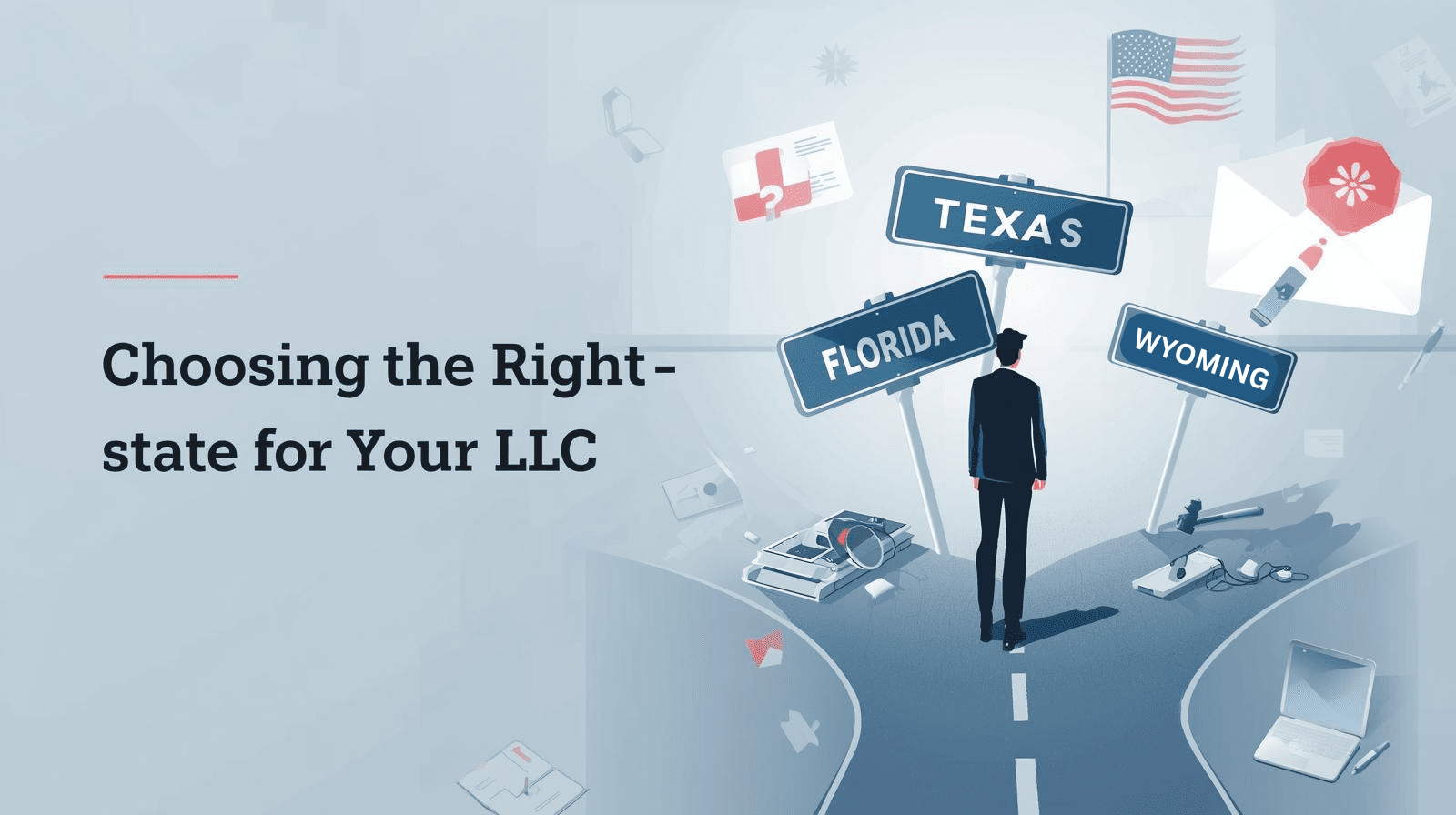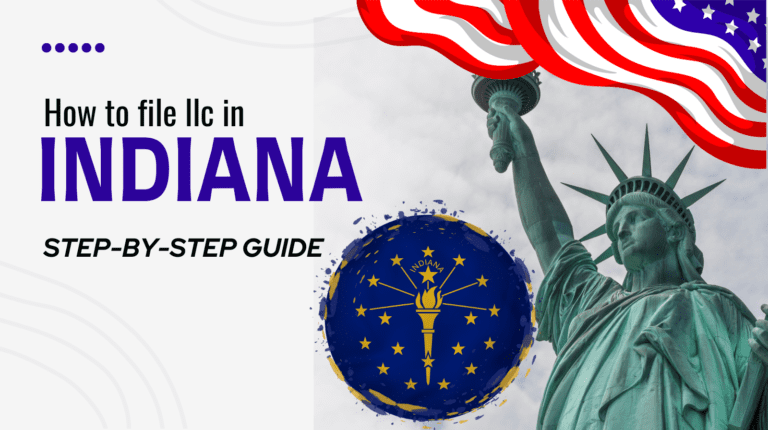The Truth About the Best State to Form an LLC: Why Your Home State Is Almost Always the Right Choice if you are US-Resident

If you’ve spent any time researching how to form an LLC in the U.S., you’ve probably heard things like:
- “Texas has great business laws and no personal income tax!”
- “Florida is the most affordable and business-friendly state!”
- “New Mexico offers unmatched privacy for LLC owners!”
While these statements contain a grain of truth, they’re often exaggerated or taken out of context. In reality, the best state to form your LLC depends almost entirely on where you live and operate your business. For most entrepreneurs—U.S. residents alike—forming your LLC in your home state is the most practical, cost-effective, and legally sound option.
Let’s unpack why forming an out-of-state LLC usually creates more problems than it solves.
Domestic vs. Foreign LLC: Understanding the Basics
Before diving deeper, it’s important to understand two key terms:
- Domestic LLC: An LLC formed in the state where you live and do business.
- Foreign LLC: An out-of-state LLC that must be registered in another state where it conducts business.
For example, imagine you live in California but decide to form your LLC in Texas because you’ve heard it has no personal income tax. The moment you start doing business in California—such as selling products, meeting clients, or managing operations—you’re required to register that Texas LLC as a Foreign LLC in California.
That means you now have:
- Two separate LLC filings (Texas and California)
- Two sets of state fees and reports
- Two Registered Agent costs
- Double the compliance responsibilities
In short, you’ve just created double the work and double the expenses.
Why Out-of-State LLCs Can Cost You More
Forming an LLC in a state you don’t live or work in may sound clever at first—until you realize how state laws actually work. Every state enforces rules that require foreign entities to register locally if they’re transacting business within state lines.
Failing to do so can lead to significant penalties. For example:
- Florida can impose fines up to $500 per day for businesses operating without foreign registration.
- Texas may revoke your company’s right to sue or enforce contracts in court if it isn’t properly registered.
- You may also owe back taxes, interest, and late filing penalties for every year your business operated unregistered.
A few years ago, the Texas Comptroller fined dozens of out-of-state businesses that failed to register as foreign entities. Some companies paid small fines, but others faced thousands of dollars in cumulative penalties and legal fees—not to mention the administrative hassle of cleaning up their filings.
The Tax Myth: “You’ll Save Money Forming in Another State”
One of the biggest myths online is that forming your LLC in a state like Texas or Florida will save you money on taxes.
Here’s the truth: You pay taxes where your business makes money, not where it’s registered.
Let’s say you form an LLC in Florida but operate entirely out of New York. You’ll still need to pay New York state income taxes because that’s where you’re doing business. Florida won’t save you a dime in that case.
Remember this simple rule:
“Taxes are paid where money is made.”
If your business operates in your home state, that’s where your tax obligations lie—regardless of where your LLC paperwork is filed.
Why States Promote “LLC-Friendly” Myths
So why do so many websites and agencies promote certain “LLC-friendly” states?
Because it’s profitable—for them and the state. For example an LLC formation company will suggest you to file LLC in Arizona because they earns significant income because they will charge you full package price maybe 500$ but the Arizona State fee is only 50$.
In short, many of these “best state to form an LLC” claims are marketing-driven rather than fact-based.
Comparing Three Commonly Hyped States
Texas
Texas is often praised for having no personal income tax. That’s true—but it’s not the full story.
Texas still requires LLCs to file a Franchise Tax Report and possibly pay the Texas Franchise Tax if revenue exceeds certain thresholds (currently over $2.47 million annually).
If your LLC doesn’t actually operate in Texas, you’ll still have to:
- Hire a Registered Agent
- Pay the state filing and annual franchise fees
- Register your business as a Foreign LLC in your home state
Result: more paperwork and higher costs.
Florida
Florida is one of the most business-friendly states in the country. Its filing fee is affordable (around $125) and there’s no personal income tax. But if you don’t live in Florida, those benefits disappear.
If you operate your business elsewhere, you’ll still need to pay income taxes where your profits are earned. And Florida requires every LLC to file an Annual Report ($150 per year) to maintain active status. If you miss the deadline, the late fee is $400.
Unless your business is truly based in Florida, forming there simply adds unnecessary complexity.
New Mexico
New Mexico is often recommended because it offers low filing fees and privacy protection (member names aren’t listed publicly). But again, that only helps if you’re actually doing business there.
If you form an LLC in New Mexico while living in Illinois, you’ll still have to register in Illinois as a foreign LLC—and pay both states’ fees.
New Mexico may make sense if you live there or your LLC actually transacts business in the state. Otherwise, it’s not worth the hassle.
What About Online Businesses?

We hear this question all the time:
“My business is 100% online. Does that mean I can choose any state?”
Not really.
Even if your business operates online, it’s still physically managed somewhere—usually from your home, a coworking space, or your laptop in a particular state. That location is considered the place of business for legal and tax purposes.
So if you live in Florida but run an online e-commerce store from your home, you’re conducting business in Florida—not in whichever state your customers happen to live.
Even digital nomads must choose a “base state,” typically where they have their driver’s license, bank accounts, and tax residency.
Real Scenarios: Common Mistakes to Avoid
Example 1: California Founder Forms in Texas
A California-based web designer formed an LLC in Texas after reading online about its “tax advantages.” But because he lived and worked in Los Angeles, California required him to register as a foreign entity. He ended up paying:
- $300 in additional filing fees
- $800 annual California franchise tax
- $100 per year for a Texas Registered Agent
All for zero tax savings.
Example 2: Illinois Resident with Utah LLC
Another entrepreneur in Illinois registered an LLC in Utah to get a lower filing cost. Later, she needed a Seller’s Permit in Illinois—but couldn’t apply without registering her Utah LLC as a foreign entity. She ended up dissolving her Utah company and forming a new one locally.
Moral of the story: Forming your LLC where you live saves time, money, and frustration.
Real Estate Investors: The One Exception
There’s one major exception—real estate LLCs.
If you’re buying property in another state, the LLC should be formed in the state where the property is located. That’s because the rental income or sale is legally tied to that state.
For instance, if you live in Arizona but buy a rental property in Texas, it’s best to form your LLC in Texas. Forming it in Arizona would require you to register as a foreign entity in Texas anyway, doubling your costs.
Some investors with multiple properties create a holding company (often in Florida or Wyoming) that owns separate LLCs in each property state. However, this should only be done after consulting a business attorney or CPA.
Non-U.S. Residents Forming LLCs
If you’re a non-U.S. resident, you can legally form an LLC in any U.S. state—there are no citizenship restrictions. But the best choice depends on your business structure.
If you have an office, staff, or physical operations in the U.S., form your LLC in that state.
If your business has no U.S. presence (for example, an online service operated from abroad), you can pick a simple and low-cost state such as New Mexico or Florida.
However, you’ll still need:
- An EIN from the IRS.Gov (you can obtain it without an SSN)
- A U.S. business bank account
- To file IRS Form 5472 if you own a single-member foreign LLC
Always consult a tax advisor familiar with non-resident taxation before choosing your state.
How to Identify Your “Home State”
If you’re unsure where your business is legally based, ask yourself these questions:
- Where do I live or pay rent?
- Where is my driver’s license issued?
- Where do I file state taxes?
- Where are my business bank accounts and utilities located?
- Where do I manage daily operations?
In nearly all cases, the answers will point to your home state—the correct place to form your LLC.
The Hidden Costs of Maintaining Multiple LLCs
When you form out-of-state, you don’t just pay extra filing fees. You also deal with:
- Multiple Registered Agents
- Two sets of annual reports and franchise taxes
- Confusion when applying for permits, licenses, or bank accounts
- Accounting complexity across multiple jurisdictions
Attorneys often joke about entrepreneurs who overcomplicate their structure too early. As one Texas lawyer put it:
“We’ve seen people create three LLCs to protect their lemonade stand before selling a single cup.”
Focus on simplicity. If your business grows, you can always restructure later.
Exceptions and Special Cases
1. Non-U.S. Residents
Non-U.S. founders can pick states strategically based on cost and ease of compliance. Florida, Texas, and New Mexico remain popular due to simple filing systems and reasonable fees.
2. Real Estate
Form the LLC in the state where the property exists. If you own properties in multiple states, consider a holding company structure after professional consultation.
The Bottom Line: Form in Your Home State
Despite all the marketing hype, forming your LLC in another state rarely makes sense for small business owners. You’ll save money, avoid penalties, and simplify your tax situation by forming your LLC where you actually live and work.
That’s why most legal professionals, tax advisors, and even major filing companies recommend the same thing:
Your home state is the best state for your LLC.
Whether you live in California, Texas, Florida, or anywhere else, forming locally keeps you compliant and stress-free.
FAQs
- What’s the cheapest state to form an LLC?
New Mexico and Florida offer low filing fees, but that doesn’t mean they’re best for you. The cheapest option is almost always your home state—because it avoids duplicate registrations. - Can an LLC save me money on corporate taxes?
No. LLCs are pass-through entities. Your profits are taxed on your personal return in the state where you earn the income. - I sell nationwide online—do I need to register in every state?
No. You only register where you run the business, not where your customers live. - What if I move states later?
You can transfer (or “re-domesticate”) your LLC to the new state or register it as a foreign entity. Always check both states’ laws before relocating.
Final Thoughts
Don’t get distracted by flashy claims about “tax-free” or “privacy-rich” states. Those advantages are often exaggerated and irrelevant to how most small businesses actually operate.
Forming your LLC in your home state keeps things simple, legal, and affordable—allowing you to focus on what really matters: building your business.



